Announcing ‘The Shriver Report Snapshot: Insight Into Intellectual Disabilities in the 21st Century’

Snapshot Reveals a Nation Divided
Exposure Increases Acceptance and Positivity; Lack of Exposure Drives Fear and Misunderstanding
Snapshot Reveals Millennial Women as Game Changers; Millennials Pushing Boomers Towards Acceptance and Inclusion
Special Olympics International Launches LET’S CHANGE THE GAME Challenge on the Eve of the Special Olympics World Games and the 25th Anniversary of the Americans with Disabilities Act
LOS ANGELES, July 24, 2015 – As America prepares to host the Special Olympics World Games and celebrate the 25th anniversary of the Americans with Disabilities Act, The Shriver Report Snapshot: Insight into Intellectual Disabilities in the 21st Century reveals a nation in the midst of change. The groundbreaking poll from Shriver Media and Special Olympics International, supported by the Richard and Cecilia Attias Foundation, conducted online by Harris Poll in July 2015, reveals that the more than half of Americans who have personal contact with someone with intellectual disabilities are increasingly accepting and positive. It also exposes that lack of contact has left a legacy of misinformation, dated stereotypes, ignorance and fear in the other nearly half of Americans. When it comes to attitudes towards people with ID, experience is the game-changing ingredient.
“Fifty years after my mother, Eunice Kennedy Shriver, founded Special Olympics in our backyard and ignited a passion and purpose for athletes around the world, we thought it was a critical time to take a deep dive into our national attitudes. We wanted to know where we are today, where we are going and who is going to take us there,” said Maria Shriver, founder of Shriver Media and Special Olympics International board member. “As a mother and activist I am deeply encouraged that young people, especially young women, are paving the way to a more conscious, caring and compassionate society. The open-minded attitudes of this generation who grew up in classrooms and playing sports with people with ID makes an undeniable case for inclusion.”
The Shriver Report Snapshot breaks as Los Angeles prepares to welcome more than 6,500 athletes and 2,000 coaches representing 165 countries at the 2015 Special Olympics World Games in Los Angeles. The global event is the largest held in Los Angeles since the 1984 Olympic Games.
“The Special Olympics movement has been a catalyst for connecting people with intellectual disabilities and encouraging greater understanding and inclusion across the world,” said Janet Froetscher, chief executive officer of Special Olympics. “Through our Special Olympics Health programs, Special Olympics Unified Sports programs and Unified Strategy for Schools and Youth, we have witnessed transformation of attitudes and perceptions about people with intellectual disabilities. The Shriver Report Snapshot: Insight into Intellectual Disabilities in the 21st Century reveals that experience, inclusion and intervention are the ways to combat isolation, intolerance and injustice. All of us have the ability to change the game and create inclusion in our communities and we are so excited to have everyone come PLAY with us.”
The #LetsChangetheGameChallenge is a call to action to people throughout the country to Play, Learn, Accept and say “Yes!” to including people with ID. Visit SpecialOlympics.org to take action.
SNAPSHOT’S KEY FINDINGS
Inclusion Works: The more than 50% of Americans Who Know Someone with an Intellectual Disability is Significantly More Informed, Accepting and Compassionate
The Shriver Report Snapshot reveals that exposure is a key indicator of Americans’ attitudes toward people with intellectual disabilities. Despite gains in visibility, the estimated 3 to 9 million people with ID living in the United States remain isolated from the rest of society.
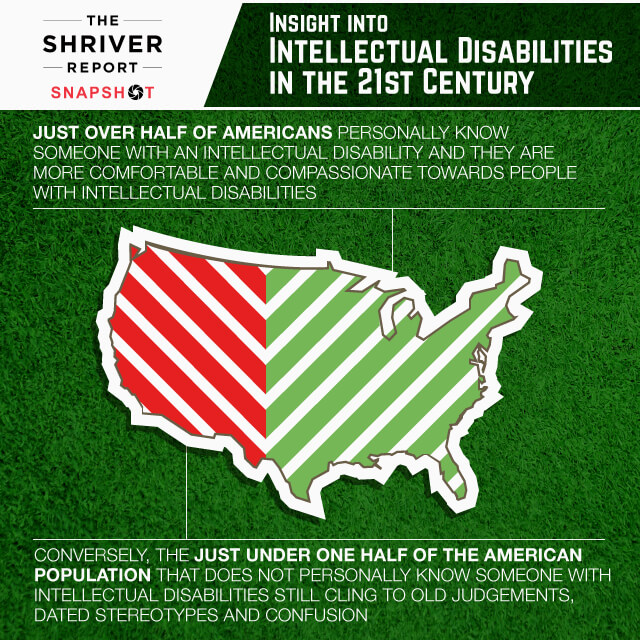
- 56% of Americans personally know someone with an intellectual disability. 42% of Americans have had no personal contact with someone with an intellectual disability. Only 13% of Americans say they have a friend with an intellectual disability and only 5% know what it is like to work with someone with ID.
- Those who personally know someone with an ID are significantly more likely than those who do not know anyone with an ID to feel at least somewhat comfortable employing (84%) or working with someone with an intellectual disability (87%), having their child in the same class as a child with intellectual disabilities (92%) and having their child date (53%) or marry (47%) someone with an intellectual disability. Nearly half of those who know do someone with ID (44%) say they have a family member who has an intellectual disability.
The Shriver Report Snapshot exposes that the opportunity to meet, befriend, play, or work with someone with an intellectual disability is exceptionally rare. This isolation perpetuates fear and misunderstanding.
Millennials Leading the Way on Acceptance and Inclusion; Except on Use of the “R-Word” and Pregnancy
Likely as a result of increased exposure and interaction, young adult Americans have more progressive attitudes toward, and expectations for, people with ID. Millennial women, ages 18-34, in general are the most compassionate, inclusive and progressive of any group surveyed.
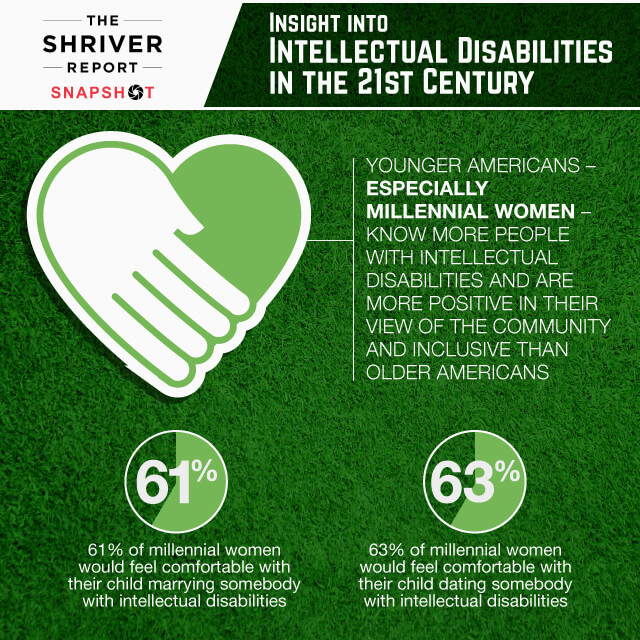
- Millennials, ages 18-34, are more likely than their older counterparts to know someone with an intellectual disability (66%) and have a greater understanding of what it means to have ID than older Americans.
- While Millennials shared a similar openness to working, having their children go to school and living near someone with ID, they were almost twice as open as those ages 65+ to having a child date (61%) or marry (59%) someone with ID.
- There are some exceptions to the rule of the open-minded Millennial. Fewer young men, ages 18-54, find using the word “retard” to describe a friend or themselves acting foolish offensive compared to older Americans. Younger women found it the most offensive.
- More than 9 in 10 Millennial women (94%), many of whom are of child bearing age, believed that at least some people would terminate a pregnancy or give a child up for adoption if they discovered an intellectual disability.
Still Okay to Use the R-Word to Describe Friends; Not Acceptable When Describing Someone with a Clear Intellectual Disability
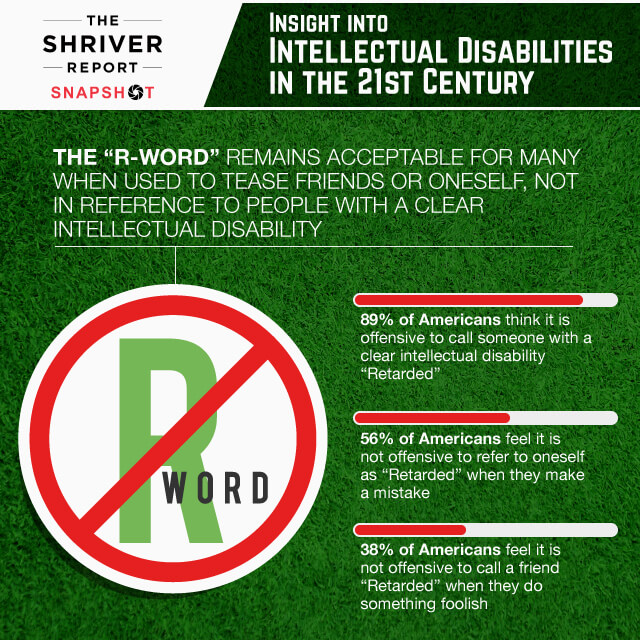
- A vast majority (89%) of Americans agree that calling someone with Down syndrome or autism a retard is offensive and find it offensive when directed at a stranger (76%) who does something foolish.
- Nevertheless, a large number of Americans think the word “retard” can be used inoffensively in other situations. Many believe it is not offensive to call a friend a retard (38%) or to describe oneself that way after making a mistake (56%).
Americans Personally Conflicted on Issues of Financial Assistance, Death Penalty Sentencing, Voting Rights and Classroom Integration
Americans show an internal conflict on what they know to be right and what they are comfortable with when it comes to perceptions of people with ID. Americans today demonstrate understanding that people with intellectual disabilities are capable of living fulfilling lives that include romantic relationships, employment, and other opportunities once denied them. Nevertheless, in practice, Americans’ comfort level with people with intellectual disabilities lag noticeably behind their evolving beliefs.

- An overwhelming majority of Americans (93%) believe that adults with intellectual disabilities should be encouraged to have jobs, and yet fewer say they would be at least somewhat comfortable employing someone with an intellectual disability (80%) or working alongside them as a co-worker (83%).
- A significant majority of Americans (62%) believe that people with intellectual disabilities and their families should receive financial assistance from the federal government.
- An overwhelming majority of Americans (84%) say that adults with intellectual disabilities should be encouraged to live independently, still nearly 1 in 10 Americans (8%) believe that all adults with intellectual disabilities should be institutionalized.
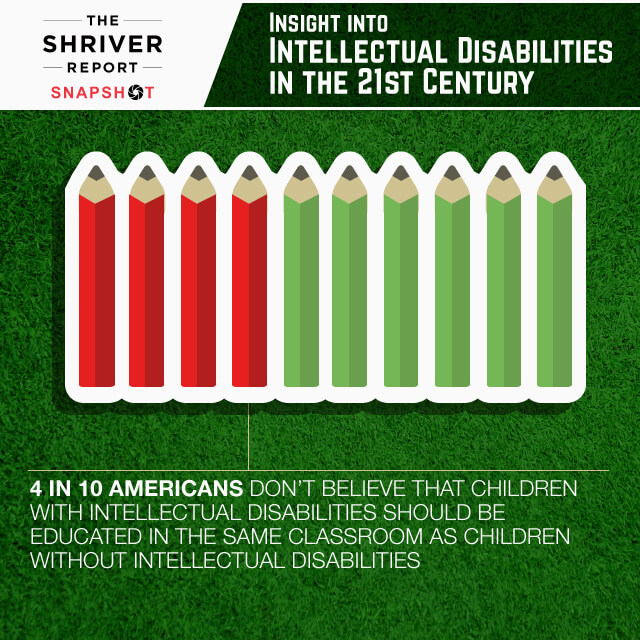
- Though 89% of Americans reported feeling comfortable having their child in a class with someone with ID, nearly 4 in 10 Americans (39%) believe that children with intellectual disability should not be integrated in the same classroom as other kids their age.
- 44% of Americans believe that a person with an intellectual disability who commits a crime where the death penalty is a possible sentence should be treated no differently than someone without an intellectual disability.
- More than 1 in 5 Americans (22%) believe that adults with intellectual disabilities should not be allowed to vote in elections.
- 26% of Americans believe that parents of children with intellectual disabilities should lower their expectations about their child’s potential for success.
Widespread Fear Still Persists About Parenting a Child with an Intellectual Disability; 9 in 10 Americans Believe Either All, Most or Some People Would Choose to Terminate Pregnancy or Give a Child Up for Adoption.
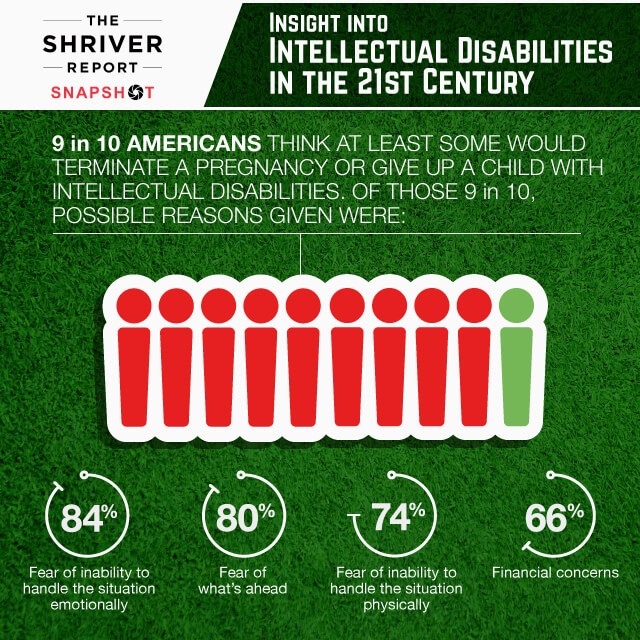
- More than 9 in 10 Americans (91%) said they would expect at least some parents to terminate a pregnancy or give the child up for adoption if they found out their child had an ID. Nearly 1 in 5 (18%) said that most would end pregnancy or give up the child.
- Of the 91% who believe that at least some US adults would terminate a pregnancy or give up a child for adoption, an overwhelming majority of them (93%) believe that fear would be the driving motivator to terminate pregnancy or give up a child for adoption in a pregnancy involving ID. This includes the fear of not being able to emotionally handle the situation (84%), the fear of not being able to physically handle the situation (74%) or simply the fear of what’s ahead (80%). For others, financial concerns would be a factor (66%) or concern about the impact on the relationship with their partner (31%).
“The findings of The Shriver Report Snapshot: Insight into Intellectual Disabilities in the 21st Century are both eye-opening and game changing. It is clear there remains a significant amount of confusion about intellectual disabilities among Americans and we are honored to partner with Shriver Media and Special Olympics International to start this meaningful conversation,” said Deana Percassi, vice president of Public Relations Research for Harris Poll.
The Shriver Report Snapshot: Insight into Intellectual Disabilities in the 21st Century was made possible by the generosity of the Richard and Cecilia Attias Foundation. “Through the outstanding work of organizations such as the Special Olympics, we have seen how sport can play a crucial role in promoting tolerance and diversity in communities. The findings of the Shriver Report Snapshot demonstrate how we must work together to create broad-reaching measures that put inclusion at the top of our agenda,” said Richard Attias. Shriver Report Snapshots are an extension of the award winning Shriver Report series. They inform, provide insight and ignite impact around the biggest social issues of our time.
SHRIVER MEDIA
Shriver Media is a 21st Century socially conscious media company that produces films, documentaries, original digital reporting and live events to inform, inspire, enlighten and entertain. Our team collaborates with like-minded partners and offers diverse media brands that we believe can impact individuals and society in a positive way. We ignite hearts and minds.
SPECIAL OLYMPICS INTERNATIONAL
Special Olympics is a global movement that unleashes the human spirit through the transformative power and joy of sports, every day around the world. We empower people with intellectual disabilities to become accepted and valued members of their communities, which leads to a more respectful and inclusive society for all. Using sports as the catalyst and programming around health and education, Special Olympics is fighting inactivity, injustice and intolerance. Founded in 1968 by Eunice Kennedy Shriver, the Special Olympics movement has grown to more than 4.5 million athletes in 170 countries. With the support of more than 1.4 million coaches and volunteers, Special Olympics delivers 32 Olympic-type sports and more than 94,000 games and competitions throughout the year. Special Olympics is supported by individuals, foundations and partners, including the Christmas Records Trust, the Law Enforcement Torch Run® for Special Olympics, The Coca-Cola Company, The Walt Disney Company and ESPN, Lions Clubs International, Mattel, Microsoft, P&G, Bank of America, Essilor Vision Foundation, the B. Thomas Golisano Foundation, Finish Line, The Safeway Foundation, and Safilo Group. Visit Special Olympics at www.specialolympics.org. Engage with us on: Twitter @specialolympics; fb.com/specialolympics; youtube.com/specialolympicshq; Instagram.com/specialolympics and specialolympicsblog.wordpress.com.
RICHARD AND CECILIA ATTIAS FOUNDATION
Part of The New York Forum Institute, the Foundation is a non-profit organization based in New York that helps business leaders and companies understand and shape the business world by sharing knowledge, perceptions, trends and ideas. Founded by Richard and Cecilia Attias, the Institute’s focus is on concrete and innovative solutions that center on economic growth, creating alliances and fostering relationships, and encouraging young talent and entrepreneurs around the world. www.ny-forum.com.
SURVEY METHODOLOGY
Harris Poll conducted the survey online within the United States on behalf of The Special Olympic Games in Partnership with Shriver Media from July 13 to July 15, 2015 among a total of 2,021 U.S. Adults ages 18+, of whom 1,103 were identified as knowing someone with an intellectual disability. Figures for age, sex, education, region and ethnicity were weighted where necessary to bring them into line with their actual proportions in the population. The data were weighted to reflect the composition of the general adult population. Propensity score weighting was used to adjust for respondents’ propensity to be online.
For full results and additional materials, click here.
Jeffrey Schneider, Schneider Global Strategy// J.schneider@schneider-gl.com
Deana Percassi, Harris Poll // Deana.Percassi@nielsen.com
